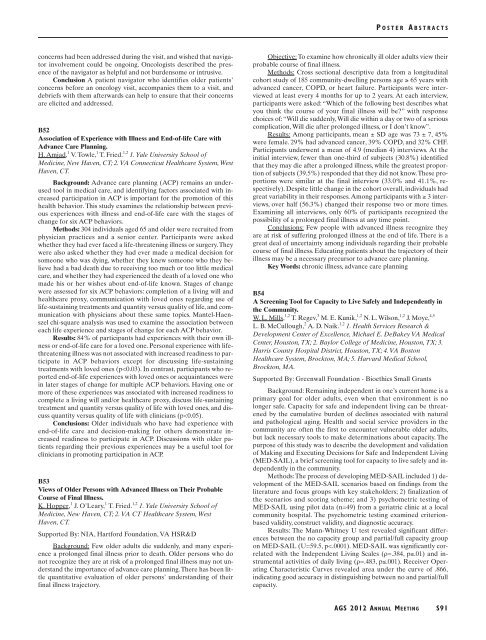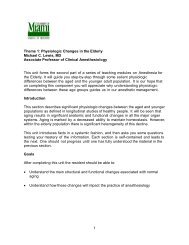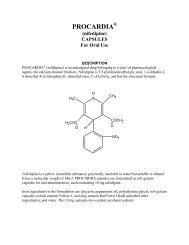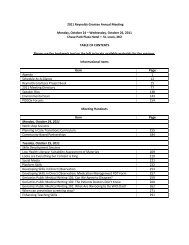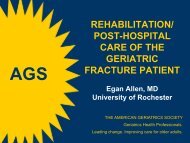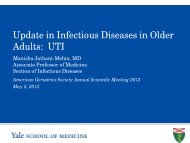P OSTER A BSTRACTS B49 Prevalence and Correlates of Self-Reported Medication Non- Adherence among Older Adults with Diabetes Mellitus, Coronary Heart Disease, and/or Hypertension. Z. A. Marcum, 1 Y. Zheng, 1 S. Perera, 1 E. Strotmeyer, 1 A. Newman, 1 E. Simonsick, 2 R. Shorr, 3 D. C. Bauer, 4 J. M. Donohue, 1 J. T. Hanlon. 1 1. University of Pittsburgh, Pittsburgh, PA; 2. NIA Intramural Research Program, Baltimore, MD; 3. VA GRECC, Gainesville, FL; 4. UCSF, San Francisco, CA. Supported By: Supported in part by National Institute on Aging grants and contracts (R56AG 0207017, P30AG024827, T32 AG021885, K07AG033174, R01AG034056, 3U01 AG012553, N01-AG-6-2101, N01-AG-6-2103, and N01-AG-6-2106), a National Institute of Mental Health grant (R34 MH082682), a National Institute of Nursing Research grant (R01 NR010135), Agency for Healthcare Research and Quality grants (R01 HS017695, K12 HS019461, R01HS018721), and a VA Health Services Research grant (IIR-06-062). This research was also supported in part by the Intramural Research program of the NIH, National Institute on Aging. Background: Medication non-adherence is common among older adults with chronic co-morbidity, but the underlying factors are largely unexplored. This study examines the prevalence and correlates of self-reported medication non-adherence among communitydwelling older adults with chronic cardiovascular conditions (i.e., diabetes mellitus [DM], coronary heart disease [CHD], and/or hypertension [HTN]). Methods: The study sample (mean [SD] age 82.1 [2.8], 52.5% female, 37.0% black) included 897 members from the Health Aging and Body Composition cohort (n=3075) with any DM (n=338; 37.7%), CHD (n=381; 42.5%), or HTN (684; 76.3%) at year 10. Selfreported medication non-adherence was measured by the 4-item Morisky Medication Adherence Scale (MMAS) and 2-item Cost-Related Non-Adherence scale (CRN) at year 11; these scales separately assess different reasons for medication non-adherence. We used multivariable logistic regression models with backward selection to identify correlates (i.e., demographic, health status, and access to care factors) of non-adherence for each measure. Results: Non-adherence by MMAS and CRN was reported by 40.7% and 7.7%, respectively. Non-adherence by MMAS was associated with black race (adjusted odds ratio=AOR=1.85, 95% interval=1.25-2.74) and hospitalization in the previous 6 months (AOR=1.97, 95% interval=1.22-3.17). Non-adherence by CRN was associated with marital status (married vs. unmarried; AOR=0.47, 95% interval=0.23-0.98) and money-related delay in medical care (AOR=6.94, 95% interval=2.41-19.97). Age, gender, and the total number of regularly scheduled medications were not associated with non-adherence by either MMAS or CRN. Conclusions: Self-reported medication non-adherence is common in older adults with chronic cardiovascular conditions, and nonadherence measured by CRN is less prevalent than MMAS. No correlates for non-adherence were detected consistently across both measures. Future studies should evaluate targeted interventions based on patient-specific modifiable barriers to improve medication adherence. B50 Health Care Proxy Involvement and Satisfaction in Decision- Making for the Treatment of Infections in Nursing Home Residents with Advanced Dementia. C. K. Ankuda, 1 J. L. Givens, 2,3 S. L. Mitchell. 2,3 1. University of Vermont College of Medicine, Burlington, VT; 2. Division of Gerontology, Beth Israel Deaconess Medical Center, Boston, MA; 3. Hebrew SeniorLife Institute for Aging Research, Boston, MA. Supported By: National Institutes of Health (NIH) Background: Infections are common in advanced dementia, and health care proxies (HCPs) are often called upon to make treatment decisions. This study describes the awareness, involvement, and satisfaction of HCPs in decision making regarding infectious episodes for a cohort of nursing home (NH) residents with advanced dementia. Methods: From 2010-2011, data were prospectively collected from 135 NH residents with advanced dementia and their HCPs at 22 Boston area facilities. For each infectious episode, information was obtained on whether the HCP: 1. could be contacted by study staff; 2. was aware of the infection; and 3. was involved in decision making. Multivariable logistic regression was used to determine resident, HCP and episode characteristics associated with HCP awareness of the infectious episode. Results: Residents experienced 287 infectious episodes (82 respiratory, 114 urinary tract infection, 37 skin and 53 fever). HCPs were able to be contacted by study staff for 217/287 episodes. Once contacted, HCPs were aware of 94/217 (43%) of episodes, and of these, were involved in decision-making for 57/94 (61%). HCP awareness of the episode was associated with the HCP being the child of the resident (vs. other relationship) [adjusted odds ratio (AOR) 2.34, 95% CI 1.19 – 4.59], female (AOR 2.79, 1.37-5.66), and the episode being treated with antibiotics (AOR 3.68, 1.56-8.66). Conclusions: The majority of infectious episodes in NH residents with advanced dementia do not involve HCPs in decision-making. Awareness of infections among HCPs is more likely for episodes treated with antibiotics, and when the HCP is the resident’s child and is female. These factors may help target infectious episodes that require greater attention with respect to better informing HCPs of their loved one’s health status. B51 Can a patient navigator get older patients and their oncologists on the same page? E. Vig, 1,2 C. Clark, 2 R. Engelberg. 2 1. <strong>Geriatrics</strong>, VAPSHCS, Seattle, WA; 2. Medicine, University of Washington, Seattle, WA. Supported By: <strong>American</strong> Cancer <strong>Society</strong> Background Older patients may approach cancer management decisions differently than younger patients. Although older patients may be more concerned about quality of life than cure, oncologists do not routinely elicit patients’ quality of life concerns. As a result, older patients and their oncologist may not be on the same page during office visits. We undertook a two phase pilot study to test whether a patient navigator intervention could facilitate shared decision-making between older patients with cancer and their oncologists. Methods In the study’s first phase, we interviewed oncologists, older cancer patients, and their family members about their decisionmaking, and whether/how a patient navigator might help. Interviews were recorded, transcribed, and analyzed using grounded theory methods. In the second phase, the patient navigator met with an older patient prior to an oncology appointment to identify his/her quality of life and other concerns. The navigator then accompanied the patient to the oncology appointment and debriefed afterwards. Several days later, an investigator debriefed separately with the oncologist and the patient/family. Content analysis and descriptive statistics were used to analyze study data. Results In the first phase, we recruited 9 oncologists from 2 clinics, 12 of their patients, and 3 of their family members. Oncologists and patients thought navigators could be helpful by clarifying understanding, taking notes, and helping patients ask questions. In the second phase, the 9 oncologists identified 9 additional patients. Prior to the navigated visits, patients identified their main concerns (mean 3 concerns, range 1-5). During the visits, the navigator reminded the patient of concerns in 4 visits, facilitated discussion about referral to a pain specialist in 1 visit, clarified referral to a cardiologist in 1 visit, and clarified the follow up plan with the oncologist in 2 visits. Patients described the navigator as helpful, reported that all their S90 AGS 2012 ANNUAL MEETING
P OSTER A BSTRACTS concerns had been addressed during the visit, and wished that navigator involvement could be ongoing. Oncologists described the presence of the navigator as helpful and not burdensome or intrusive. Conclusion A patient navigator who identifies older patients’ concerns before an oncology visit, accompanies them to a visit, and debriefs with them afterwards can help to ensure that their concerns are elicited and addressed. B52 Association of Experience with Illness and End-of-life Care with Advance Care Planning. H. Amjad, 1 V. Towle, 1 T. Fried. 1,2 1. Yale University School of Medicine, New Haven, CT; 2. VA Connecticut Healthcare System, West Haven, CT. Background: Advance care planning (ACP) remains an underused tool in medical care, and identifying factors associated with increased participation in ACP is important for the promotion of this health behavior. This study examines the relationship between previous experiences with illness and end-of-life care with the stages of change for six ACP behaviors. Methods: 304 individuals aged 65 and older were recruited from physician practices and a senior center. Participants were asked whether they had ever faced a life-threatening illness or surgery. They were also asked whether they had ever made a medical decision for someone who was dying, whether they knew someone who they believe had a bad death due to receiving too much or too little medical care, and whether they had experienced the death of a loved one who made his or her wishes about end-of-life known. Stages of change were assessed for six ACP behaviors: completion of a living will and healthcare proxy, communication with loved ones regarding use of life-sustaining treatments and quantity versus quality of life, and communication with physicians about these same topics. Mantel-Haenszel chi-square analysis was used to examine the association between each life experience and stages of change for each ACP behavior. Results: 84% of participants had experiences with their own illness or end-of-life care for a loved one. Personal experience with lifethreatening illness was not associated with increased readiness to participate in ACP behaviors except for discussing life-sustaining treatments with loved ones (p
- Page 1:
Dear Annual Meeting Attendee: The A
- Page 8 and 9:
P APER A BSTRACTS the National Deat
- Page 10 and 11:
P APER A BSTRACTS two counts were u
- Page 12 and 13:
P APER A BSTRACTS management in col
- Page 14 and 15:
P APER A BSTRACTS control collagen
- Page 16 and 17:
P APER A BSTRACTS creating a barrie
- Page 18 and 19:
P APER A BSTRACTS Conclusion: This
- Page 20 and 21:
P APER A BSTRACTS rates for CRs wer
- Page 22 and 23:
P APER A BSTRACTS each definition
- Page 24 and 25:
P OSTER A BSTRACTS been ruled out.
- Page 26 and 27:
P OSTER A BSTRACTS Discussion: Angi
- Page 28 and 29:
P OSTER A BSTRACTS calcitriol via 1
- Page 30 and 31:
P OSTER A BSTRACTS ii J Clin Micrbi
- Page 32 and 33:
P OSTER A BSTRACTS is on the rise.
- Page 34 and 35:
P OSTER A BSTRACTS edema (60%), and
- Page 36 and 37:
P OSTER A BSTRACTS categories based
- Page 38 and 39:
P OSTER A BSTRACTS Methods: A longi
- Page 40 and 41:
P OSTER A BSTRACTS Design. CaMos is
- Page 42 and 43:
P OSTER A BSTRACTS incidents (64%)
- Page 44 and 45:
P OSTER A BSTRACTS TNF-R1 levels we
- Page 46 and 47: P OSTER A BSTRACTS curriculum betwe
- Page 48 and 49: P OSTER A BSTRACTS A75 Geriatrics a
- Page 50 and 51: P OSTER A BSTRACTS Design: Based on
- Page 52 and 53: P OSTER A BSTRACTS medicine fellows
- Page 54 and 55: P OSTER A BSTRACTS While we were no
- Page 56 and 57: P OSTER A BSTRACTS and knowledge pr
- Page 58 and 59: P OSTER A BSTRACTS made more eye co
- Page 60 and 61: P OSTER A BSTRACTS This study’s p
- Page 62 and 63: P OSTER A BSTRACTS that a substanti
- Page 64 and 65: P OSTER A BSTRACTS articulate goals
- Page 66 and 67: P OSTER A BSTRACTS transitions invo
- Page 68 and 69: P OSTER A BSTRACTS findings suggest
- Page 70 and 71: P OSTER A BSTRACTS and its sum of b
- Page 72 and 73: P OSTER A BSTRACTS NTM infection wa
- Page 74 and 75: P OSTER A BSTRACTS death because
- Page 76 and 77: P OSTER A BSTRACTS A158 Curved Path
- Page 78 and 79: P OSTER A BSTRACTS compared to pati
- Page 80 and 81: P OSTER A BSTRACTS Methods: We are
- Page 82 and 83: P OSTER A BSTRACTS with only about
- Page 84 and 85: P OSTER A BSTRACTS with typical ris
- Page 86 and 87: P OSTER A BSTRACTS The aim of this
- Page 88 and 89: P OSTER A BSTRACTS B27 Shared Decis
- Page 90 and 91: P OSTER A BSTRACTS SES, adiposity a
- Page 92 and 93: P OSTER A BSTRACTS care (OR 1.93, 9
- Page 94 and 95: P OSTER A BSTRACTS Conclusion: Agin
- Page 98 and 99: P OSTER A BSTRACTS Conclusions: The
- Page 100 and 101: P OSTER A BSTRACTS B61 Losartan inc
- Page 102 and 103: P OSTER A BSTRACTS Conclusions Our
- Page 104 and 105: P OSTER A BSTRACTS Significant incr
- Page 106 and 107: P OSTER A BSTRACTS frailty have inc
- Page 108 and 109: P OSTER A BSTRACTS Conclusion: In t
- Page 110 and 111: P OSTER A BSTRACTS BMI=28.4, mean P
- Page 112 and 113: P OSTER A BSTRACTS Each subject’s
- Page 114 and 115: P OSTER A BSTRACTS There is growing
- Page 116 and 117: P OSTER A BSTRACTS variation in uti
- Page 118 and 119: P OSTER A BSTRACTS complex elders s
- Page 120 and 121: P OSTER A BSTRACTS satisfaction wit
- Page 122 and 123: P OSTER A BSTRACTS Methods: The Hon
- Page 124 and 125: P OSTER A BSTRACTS B130 Early Disco
- Page 126 and 127: P OSTER A BSTRACTS IgE antibodies i
- Page 128 and 129: P OSTER A BSTRACTS contribution by
- Page 130 and 131: P OSTER A BSTRACTS The oldest old (
- Page 132 and 133: P OSTER A BSTRACTS B153 Encore Pres
- Page 134 and 135: P OSTER A BSTRACTS B159 Accuracy of
- Page 136 and 137: P OSTER A BSTRACTS GDS and GDS apat
- Page 138 and 139: P OSTER A BSTRACTS status, procedur
- Page 140 and 141: P OSTER A BSTRACTS In this case it
- Page 142 and 143: P OSTER A BSTRACTS the episodes of
- Page 144 and 145: P OSTER A BSTRACTS paralysis is see
- Page 146 and 147:
P OSTER A BSTRACTS grip strength ch
- Page 148 and 149:
P OSTER A BSTRACTS Discussion/Concl
- Page 150 and 151:
P OSTER A BSTRACTS Results: Of 1401
- Page 152 and 153:
P OSTER A BSTRACTS Results: Regiona
- Page 154 and 155:
P OSTER A BSTRACTS Conclusions: Con
- Page 156 and 157:
P OSTER A BSTRACTS 2.47-25.96), and
- Page 158 and 159:
P OSTER A BSTRACTS Methods: EMR ACP
- Page 160 and 161:
P OSTER A BSTRACTS patient populati
- Page 162 and 163:
P OSTER A BSTRACTS C71 Outpatient A
- Page 164 and 165:
P OSTER A BSTRACTS IPE are generall
- Page 166 and 167:
P OSTER A BSTRACTS the outpatient s
- Page 168 and 169:
P OSTER A BSTRACTS 0.03). Age and s
- Page 170 and 171:
P OSTER A BSTRACTS C94 Exploring th
- Page 172 and 173:
P OSTER A BSTRACTS with the least e
- Page 174 and 175:
P OSTER A BSTRACTS physician resist
- Page 176 and 177:
P OSTER A BSTRACTS Table 1. Effect
- Page 178 and 179:
P OSTER A BSTRACTS C118 Patient and
- Page 180 and 181:
P OSTER A BSTRACTS We monitor the t
- Page 182 and 183:
P OSTER A BSTRACTS PROGRAM STRUCTUR
- Page 184 and 185:
P OSTER A BSTRACTS C135 Encore Pres
- Page 186 and 187:
P OSTER A BSTRACTS C141 Contributio
- Page 188 and 189:
P OSTER A BSTRACTS nal process can
- Page 190 and 191:
P OSTER A BSTRACTS project, we atte
- Page 192 and 193:
P OSTER A BSTRACTS Methods: Two hun
- Page 194 and 195:
P OSTER A BSTRACTS Case: A 78 year-
- Page 196 and 197:
P OSTER A BSTRACTS two synergistic
- Page 198 and 199:
P OSTER A BSTRACTS then awoke spont
- Page 200 and 201:
P OSTER A BSTRACTS cancer, non mali
- Page 202 and 203:
P OSTER A BSTRACTS The diagnosis of
- Page 204 and 205:
P OSTER A BSTRACTS D32 Comparison o
- Page 206 and 207:
P OSTER A BSTRACTS D38 The burden o
- Page 208 and 209:
P OSTER A BSTRACTS rate was 21.9% f
- Page 210 and 211:
P OSTER A BSTRACTS D50 A Pilot Stud
- Page 212 and 213:
P OSTER A BSTRACTS of the education
- Page 214 and 215:
P OSTER A BSTRACTS and geriatrics c
- Page 216 and 217:
P OSTER A BSTRACTS Care Surgery, Em
- Page 218 and 219:
P OSTER A BSTRACTS survey using the
- Page 220 and 221:
P OSTER A BSTRACTS & Go Test, and T
- Page 222 and 223:
P OSTER A BSTRACTS binge drinking d
- Page 224 and 225:
P OSTER A BSTRACTS The percentages
- Page 226 and 227:
P OSTER A BSTRACTS other forms of t
- Page 228 and 229:
P OSTER A BSTRACTS D102 Clinician
- Page 230 and 231:
P OSTER A BSTRACTS this result repr
- Page 232 and 233:
P OSTER A BSTRACTS D114 Fall Reduct
- Page 234 and 235:
P OSTER A BSTRACTS D120 Geropsychia
- Page 236 and 237:
P OSTER A BSTRACTS In addition to 7
- Page 238 and 239:
P OSTER A BSTRACTS D132 Encore Pres
- Page 240 and 241:
P OSTER A BSTRACTS Conclusions: The
- Page 242 and 243:
P OSTER A BSTRACTS D144 The Use of
- Page 244 and 245:
P OSTER A BSTRACTS Methods: Cross-s
- Page 246 and 247:
P OSTER A BSTRACTS CONCLUSIONS: The
- Page 248 and 249:
P OSTER A BSTRACTS Aggressive treat
- Page 250 and 251:
A UTHOR I NDEX Azhar, G . . . . . .
- Page 252 and 253:
A UTHOR I NDEX Ceimo, J . . . . . .
- Page 254 and 255:
A UTHOR I NDEX Dunn, C M . . . . .
- Page 256 and 257:
A UTHOR I NDEX Griebling, T L . . .
- Page 258 and 259:
A UTHOR I NDEX Johnson, K . . . . .
- Page 260 and 261:
A UTHOR I NDEX Levine, M . . . . .
- Page 262 and 263:
A UTHOR I NDEX Mulsant, B . . . . .
- Page 264 and 265:
A UTHOR I NDEX Pschirer, J P . . .
- Page 266 and 267:
A UTHOR I NDEX Sheppard, K D . . .
- Page 268 and 269:
A UTHOR I NDEX Ukritchon, S . . . .
- Page 270 and 271:
K EYWORD 25-hydroxyvitamin D . . .
- Page 272 and 273:
K EYWORD I NDEX Colorectal cancer s
- Page 274 and 275:
K EYWORD I NDEX Geriatric curriculu
- Page 276 and 277:
K EYWORD I NDEX Medication discrepa
- Page 278 and 279:
K EYWORD I NDEX Race . . . . . . .
- Page 280:
This page intentionally left blank


